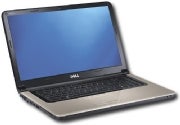Sure, I've read reports about overheating laptops--even ones that get so hot they set on fire--but I always thought that it was the kind of thing that happened only to other people. You know, the really unlucky people.
Well, my luck, it seems, has changed: I recently lost a laptop (but luckily, nothing else) to sky-high temperatures. The experience was frightening, and resolving it with Dell, the laptop's manufacturer, was often frustrating--far more exasperating than I would have expected.
Too Hot to Handle
 I purchased a Dell Studio s15Z laptop from a Best Buy store in February 2010, and used it without incident until this July. That's when I tried to boot up my laptop to do a bit of work only to find that it wouldn't start. I pressed the power button a couple of times, but never got any sort of response. Thinking the battery might be dead, I made sure the laptop was plugged in, but still no luck. I took the battery out and reinserted it to ensure that it was properly connected, but that didn't help. Mystified, I walked away.
I purchased a Dell Studio s15Z laptop from a Best Buy store in February 2010, and used it without incident until this July. That's when I tried to boot up my laptop to do a bit of work only to find that it wouldn't start. I pressed the power button a couple of times, but never got any sort of response. Thinking the battery might be dead, I made sure the laptop was plugged in, but still no luck. I took the battery out and reinserted it to ensure that it was properly connected, but that didn't help. Mystified, I walked away.
A few hours later, I decided to try again. I set the laptop on a wooden coffee table and pressed the power button. Immediately, I heard the disk whir to life, giving me the false impression that it was about to start up--until I saw smoke seeping out from between the keys, that is. I thought my eyes were deceiving me, so I picked up the computer for a closer look, resting it on my six-months-pregnant belly. I was not imagining anything; smoke was pouring out of the keyboard, much heavier now, and the computer itself was shockingly hot to the touch. The air took on the odor of burning chemicals, and I quickly unplugged the computer from its charger.
That's when I noticed that the smoke coming from the keyboard was nothing compared to what was coming out of the back of the computer, near the battery compartment: thick, orange and black smoke that looked to me as if it contained flames. I slammed the laptop shut and dashed for the door, prepared to toss the laptop onto the lawn, away from the house and any of its occupants.
I never got that far; by the time I made it outside, the smoke had stopped, leaving an acrid smell and a toasty computer in its wake. I rested the computer gently on the lawn, letting it sit for a while before I dared to touch it again.
Dell's Reaction
I called Dell's technical support line as soon as possible after the incident (I had to wait a few days, due to a weekend and a Monday holiday). After I explained the situation, the support representative responded with only: "Is this something that is happening to your computer right now?"
My response: "No, I made sure the fire was out before I called, and I haven't tried to turn the computer on since."
I wasn't entirely sure whether the tech support rep failed to understand the full details of what I'd told him, or whether he was just completely nonplussed by my story. His reaction, however, turned out to be the same as that of all the reps I spoke to during that first call; it took almost an hour, and I was transferred among three different people (one of whom was a manager). No one seemed alarmed about my experience--which definitely raised some alarms for me.
Another cause for concern: Each of the three men I spoke with on that call assured me that Dell would fix my computer and send it back to me--no matter how much I protested that I did not want this computer back. I tried to explain that I was worried that the computer could set my house on fire, but the only assurance I could get was that if Dell really did determine that the machine was unsafe to use, they would send me a replacement system. I was not entirely comforted, though, as the priority of everyone I spoke to seemed to be returning my original laptop to me.
According to Dell, the reps take this approach because most people who send their laptops in for repair want their original systems sent back. "When a customer calls with a situation, we absolutely investigate it. We want to make sure our systems are operating in a safe manner. We need to capture the system to make sure we can investigate. Some customers are reluctant to send in their laptops because they don't want to part with them or with the materials that the computer contains," says Anne Camden, a Dell spokesperson.
Next: Waiting for a Replacement
No comments:
Post a Comment